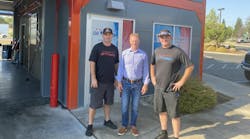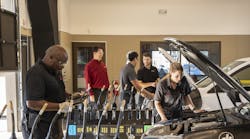In this industry, success often comes down to the numbers. But that’s just one part of the equation. Holistically, success takes into account not only the hard numbers, but also the overall strategy and execution involved in running an operation.
Mike Biddle, Chief Operations Officer and Partner at The Alamitos Group, understands this and knows that the hard work is worth it.
The Alamitos Group is a family owned and operated Jiffy Lube franchise that was started in 1995 by Biddle and his brother-in-law Robert Curry. Since then, operations have grown to 22 locations in the Greater Los Angeles and Little Rock regions.
Recently, The Alamitos Group was named “Franchisee of the Year” by Jiffy Lube. This title is bestowed upon a franchise that shows outstanding commitment to the brand as well as its customers and employees.
“I think there probably were a few things that helped us earn that honor,” Biddle says. “Over the last several years we have worked really hard to increase our guest counts and sales year over year, especially with some of our newer services that Jiffy Lube offers.”
For The Alamitos Group, this has included but is not limited to; incorporating a hands-on training center at one of their locations as well as a robust career development plan for employees that offers insight on Jiffy Lube services and crucial management skills.
“I think management needs to be really decentralized when you have multiple units in your group. You need to trust in your people.” Biddle says.
Navigate Obstacles
The Alamitos Group has established a solid structure despite the hardships that these past couple of years have brought upon the industry.
“For us, within our Group, 2021 was by far the hardest year ever since we started our business.” Biddle says.
He cites navigating the pandemic, supply chain disruptions and staffing issues as some of the main reasons for this.
Overcoming these challenges is not an easy feat, and continues to be an on-going battle for many areas of this industry.
“In today's business environment, operators really need to be extremely adaptive and agile.” Biddle says.
In an effort to tackle staffing concerns, Biddle says that the Group has worked closely with their Human Resources team during the pandemic to track COVID-19 infection levels and determine the need of staff and operation hours for their locations.
Nowadays, it has gone beyond the pandemic into broader recruitment and retainment strategies.
“Our HR group and operations meets often to discuss recruiting strategies as well as how we can improve our company culture so that we can better retain those good employees that we are able to hire, [and] to help find new employees.” Biddle explains.
In regards to other issues, such as the struggle of getting supplies like oil and oil filters due to supply chain disruptions, Biddle says that The Alamitos Group has prioritized communication.
The Group set up weekly calls to monitor shipments with vendors, built up strong relationships with secondary vendors and kept lines of communication open between primary and secondary vendors to monitor the supply issue.
Anticipate Future Achievements
An especially satisfying element from last year actually started back in 2018 when Biddle set a team goal to hit $25 million for the stores in California. In 2021, the Group was able to achieve this and more.
“2021 was an absolute dichotomy of a year for us,” Biddle says. “We not only hit $25 million, we exceeded by well over a million dollars. So that was a major success we were really proud of.”
The Alamitos Group went from 14 to 22 stores in 2021, which sets up the Group well for achieving other goals in the future.
But beyond that, Biddle believes that there is plenty for operators to look forward to in general, even if it comes with some additional challenges.
Biddle foresees high gas prices, in the short term, causing compounding factors for customers that may include a smaller budget for vehicle maintenance.
“They have limited budgets to spend on servicing their vehicles,” Biddle says. “We need to make sure that we explain services that might be of most importance to their vehicle safety, as well as keeping it on the road in good operating condition for a longer period of time and help them make decisions on how to best maintain their vehicle.”
Looking further ahead, Biddle believes that despite rapid changes in vehicle technology and the kinds of cars that people are driving, the vehicle maintenance industry can stand the test of time if operators are willing to collaborate.
“I think operators really need to work together to share best practices. We need to learn from one another and be adaptive in how we handle our business,” he says. “By doing those things effectively, I think good operators are going to really thrive over the next 20 to 30 years.”





